In this article:
After making a hot bowl of soup, seasoning it with rosemary is the go-to move for many because rosemary is known to elevate the taste of these dishes and hence is very famous in the culinary world.
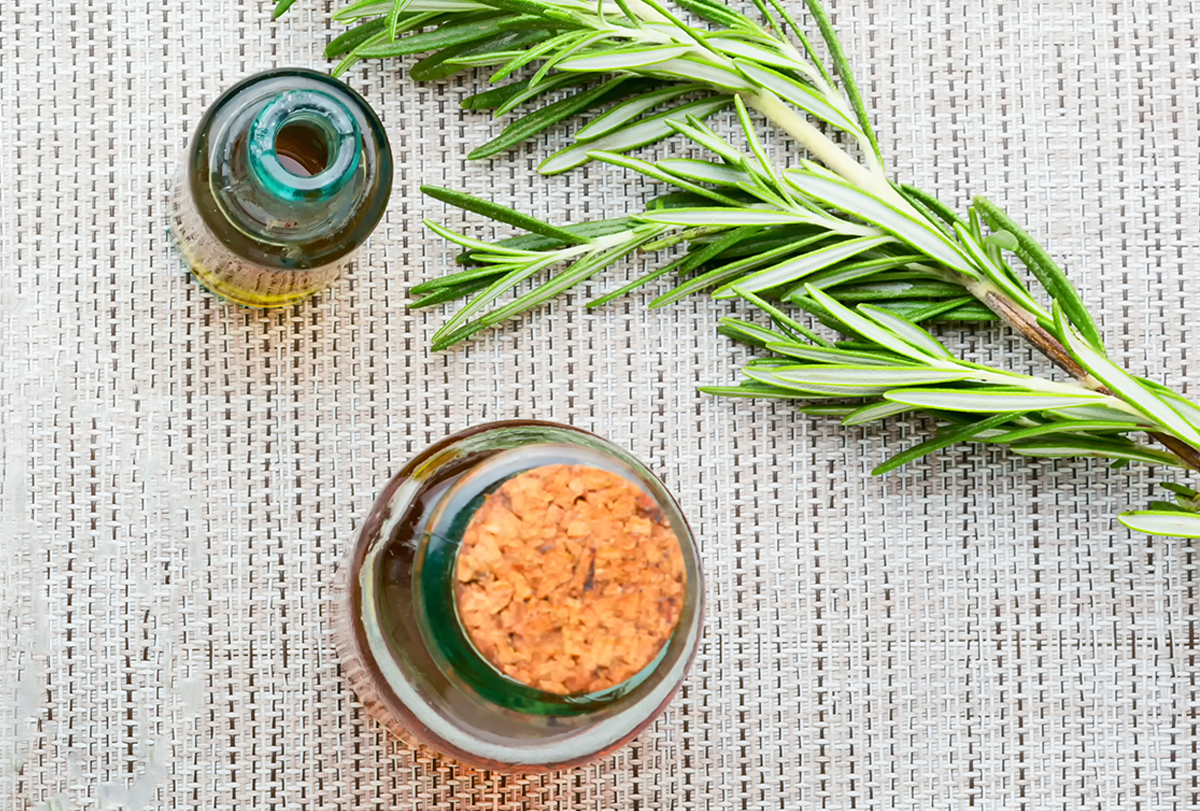
But did you know that this herb does not only enhance the taste of food but also offers a lot of medicinal/therapeutic benefits? (1)
Rosemary has a wealthy chemical profile and high antioxidant levels that make it very good for your health. It can positively rejuvenate your body and your hair!
Rosemary improves blood circulation to the scalp, thereby supporting hair health and its overall development. This is why many users and hair specialists swear by the use of rosemary water rinse for promoting hair growth. (2)
To use rosemary water for your hair, you can simply put it in a spray bottle and then spray it on your hair after shampooing. However, to make it even more advantageous for your hair, you can mix a few ingredients into it and make yourself an amazing hair care potion.
Continue reading to learn more about what you can combine with rosemary water to facilitate the growth of your hair.
Ingredients to Mix with Rosemary Water for Hair Growth
Several natural ingredients can be used with rosemary to improve the growth of your hair.
1. Aloe vera gel
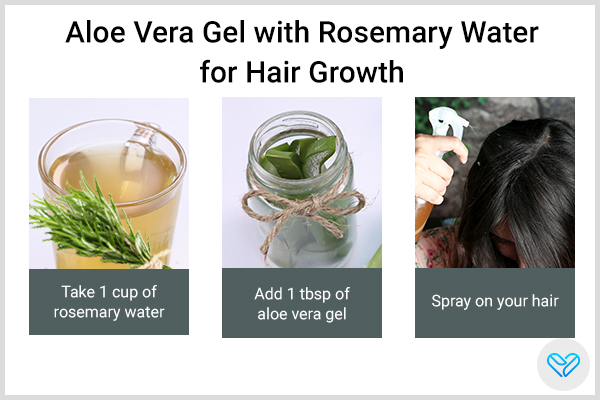
Aloe vera has made its name in the cosmetic world for thousands of reasons. Providing a lot of benefits from soothing to moisturizing the skin, aloe vera has become a staple in everyone’s skin care cabinet. (3)
What might come as news to you is that aloe vera gel is also very good for your hair. In fact, it was used in the hair care routine of royalty in ancient Egypt. Queen Cleopatra is known to be an advocate of aloe vera gel use for promoting hair growth and discouraging hair loss. (4)
Experts say that aloe vera’s positive effects on hair can be because of its exceptionally brilliant chemical profile and high moisture content. (5)
And if it’s good enough for the queen of Egypt, it is certainly good enough for your locks too!
How to use it:
- Add 1 tbsp of aloe vera gel to the 1 cup of rosemary water. Mix well.
- Use this as a leave-in mask on your hair.
2. Castor oil
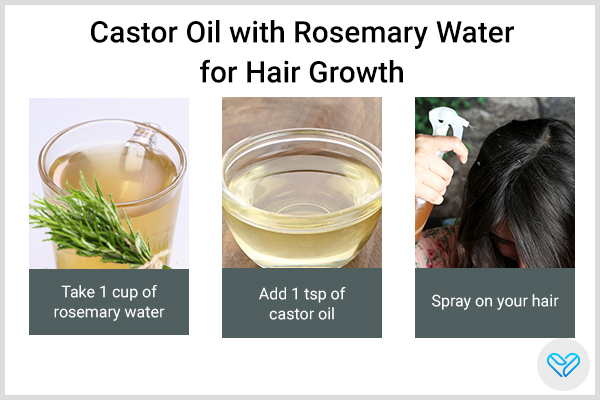
Castor oil is a product of the plant Ricinus communis, which is very well known in many places as a nourishing agent for the hair and promoter of hair health.
In fact, scientists have been experimenting on the potential of castor oil in the hair care industry as they have found that this oil can penetrate deeply into the hair shaft and restrict an enzyme called PGD2, which is accountable for alopecia or hair loss. (6)
This makes castor oil a good candidate to be mixed in with rosemary water for application to the hair.
How to use it:
- Combine 1 tsp of castor oil with 1 cup of rosemary water.
- Use the mixture as a hair spray.
3. Lavender flowers
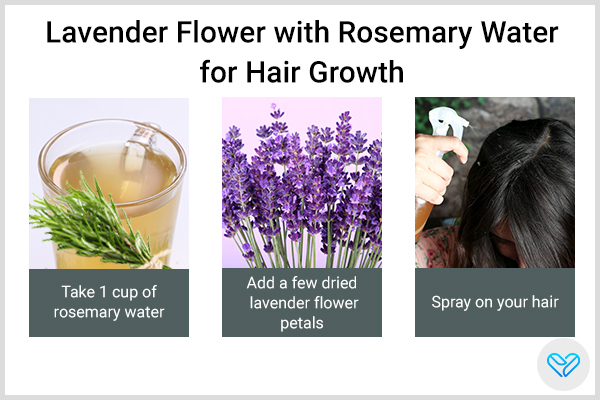
The beautiful lavender flowers that are a mesmerizing site for your eyes can also be a very useful ingredient for your hair. According to a study, lavender oil can be used to promote hair growth.
Researchers have found that lavender oil was successful in improving the depth of hair follicles and also enhanced dermal thickness in animal models. All of these effects point toward healthy hair growth. (7)
Using dried lavender flowers with rosemary water can be a very good remedy for your hair.
How to use it:
- In a clean glass jar, pour 1 cup of rosemary water and add 3-4 dried lavender flower petals to it.
- Close the jar and leave it undisturbed for a day or two.
- Use the mixture as a spray or a hair rinse.
4. Green tea
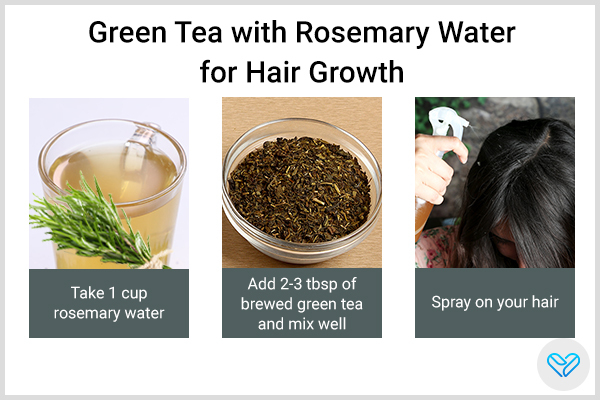
You must already be aware of the incredible effects of green tea on the entire body. From TV advertisements to magazine sheets, green tea’s usefulness in treating various health issues is quite literally everywhere.
Green tea is rich in antioxidants, making it your ideal partner in your quest for healthy hair. In fact, it is also quite abundant in compounds called catechins, which promote hormonal balance and thereby discourage hair loss.
A study demonstrated that animal models, upon being treated with green tea extracts, showed noteworthy hair growth in merely 6 months. (8)
Also, topical use of green tea can safeguard you from dandruff problems, making it a promising component to use with rosemary water.
How to use it:
- To 1 cup of rosemary water, add 2-3 tbsp of strongly brewed green tea. Mix well.
- Add the mixture to a spray bottle.
- Rinse your hair using this blend after shampooing.
5. Sage leaves
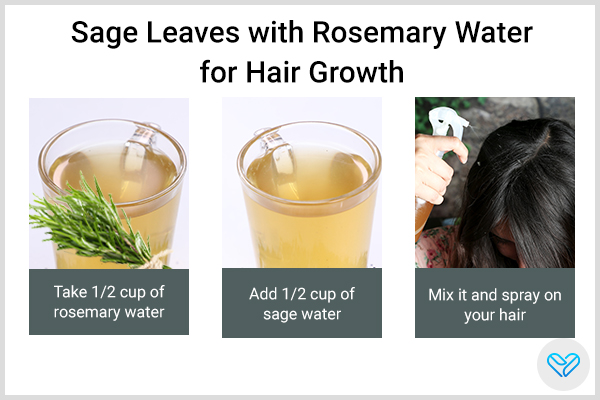
Sage is a very popular herb that, coincidentally, belongs to the same family as rosemary, Lamiaceae, which is also known as the mint family. (9) It is native to the Mediterranean but is famous all around the world.
Since time unknown, it has been actively utilized in hair care rituals because of its ability to support hair health while keeping hair fall away.
Scientists have found that this plant contains a chemical called beta-sitosterol, which has been confirmed to be effectual in the management of male-pattern baldness. (10)
So, the next time you wish to give your hair a rosemary rinse, simply add sage leaves to it too.
How to use it:
- Simmer a handful of rosemary leaves in 1 cup of water in one pot and sage leaves in another.
- Let both of them cool down and then strain both in separate cups.
- Mix the two in comparable quantities and store the mixture in a spray bottle.
- Use the mixture on your hair after hair wash.
6. Apple cider vinegar
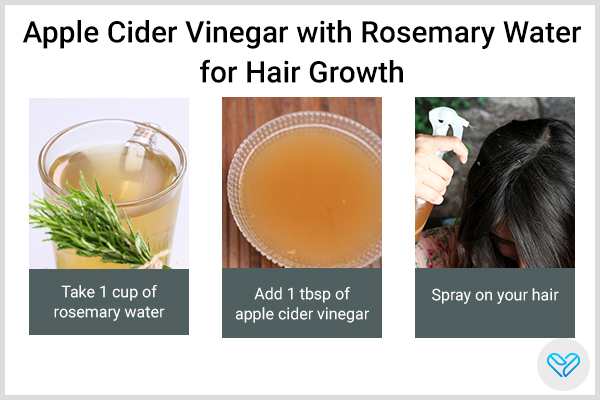
Apple cider vinegar (ACV) is, as the name suggests, vinegar that is derived from apples. Research has deemed it to be very good for hair use because it has the inherent property of fighting dandruff-causing fungi (Malassezia furfur), which hinders hair growth. (11)
ACV also serves as a natural cleanser for your scalp as it helps in the removal of debris and residues from the hair when used topically. Also, it has conditioning properties and leaves your hair very soft and silky after use. (11)
Since ACV has countless hair benefits, it can do wonders for your hair, which is why it is perfect to be used with rosemary water.
How to use it:
- Add 1-2 tbsp of ACV in 1 cup of rosemary water.
- Spray the mixture on your hair after shampooing.
How to Make Rosemary Water?
You can easily make rosemary water at home. Simply follow these steps:
- Gather some fresh rosemary leaves. You can pluck them fresh from your garden (if possible) or simply buy high-quality ones from a store.
- Boil 2 cups of water in a pot.
- Add a handful of rosemary leaves to the pot once the water begins to boil.
- Let the leaves simmer in the water for around 15 minutes.
- Remove the pot from the heat and let it cool.
- Strain the rosemary water and store it in a sealed jar.
Most-Asked Questions
Does rosemary water really promote hair growth?
Many experts claim that rosemary water can help facilitate hair growth due to its ability to improve scalp circulation.
How often should I use rosemary water on my hair?
Start with a once-a-week application and adjust as needed.
Can I leave rosemary water in my hair overnight?
Yes, you can leave rosemary water in your hair overnight for a deep treatment.
Are there any side effects of using rosemary water on hair?
Rosemary water is deemed to be safe for most people, but it’s likely to have an inflammatory response in some people who are allergic to rosemary.
Can I mix other ingredients with rosemary water for better results?
Yes, you can mix rosemary water with other ingredients.
Final Word
The effects of rosemary water, which is known for its potential to promote hair growth, can be enhanced by mixing it with various beneficial ingredients. These DIY recipes can be a very affordable and straightforward way of giving your hair a quick and healthy boost!
- Was this article helpful?
- YES, THANKS!NOT REALLY


